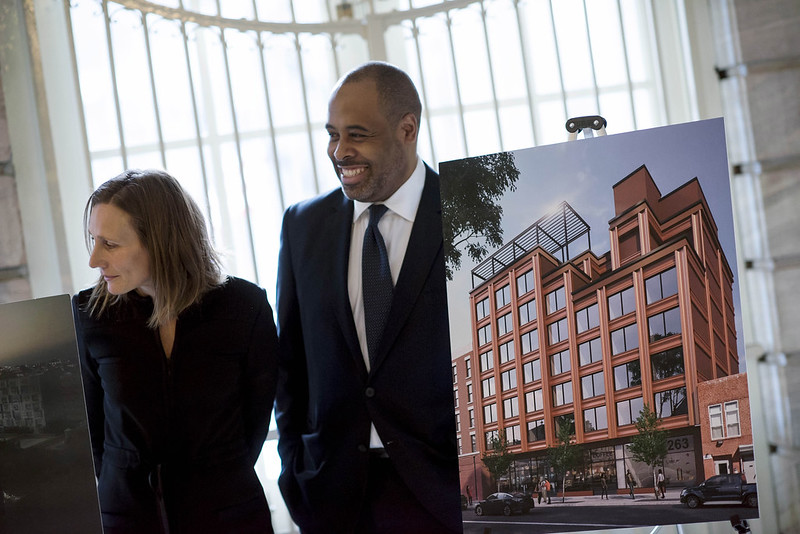
Housing at stake (photo: Ed Reed/Mayoral Photography Office)
New York City’s nonprofit supportive housing community, which has for decades successfully provided deeply affordable housing to formerly unhoused and low-income individuals, is increasingly endangered by New York’s mounting housing crisis.
Study after study has shown that supportive housing – a combination of affordable housing and voluntary services like case management and mental health and addiction counseling – is the most effective method to combat chronic homelessness and put people on the path to healthy, independent living. Maintaining that track record of success requires consistent funding, a well-trained and competitively compensated workforce, and a flexible and responsive continuum of care for tenants with the most acute needs.
As a form of independent rental housing – not a residential or treatment program – supportive housing tenants sign a lease upon moving in, which typically requires them to pay 30% of whatever income they have toward rent. This is in line with the federal affordability standard and is critical to support nonprofit providers’ financial solvency and their ability to provide vital services.
Operating on razor-thin margins, providers must rely on timely rent payments to keep the lights on and staff paid, and they partner with all levels of government to offer dramatically reduced rents to the households in most need.
Today, supportive housing and low-income tenants are struggling. It’s estimated that nearly one in three tenants in affordable housing owes back rent, adding up to nearly $2 billion in missing rent payments. More than 70,000 NYCHA tenants alone owe a total of $466 million in back rent. While NYCHA’s fiscal crisis has been widely reported, less attention has been given to the similar fate nonprofit housing providers face if relief from government partners is not provided.
In supportive housing, nonpayment of rent is one of the first indications that tenants may be in crisis. Good providers have layers of systems in place to help tenants get back on track. They collaborate with the onsite social service provider to problem solve - including creating manageable payment plans. This engagement often works, obviating the need for further action.
When tenants cannot or will not work with service providers, the only available option is applying for a “one shot deal” (OSD) from the city. This covers the amount tenants are in arrears so they can remain housed, and buildings can continue to operate. To apply for an OSD, tenants must file a cash assistance case with the Human Resources Administration (HRA). While it is not an official policy to have a Housing Court case to get an OSD, it is the experience of nonprofit providers that demonstrating imminent risk of eviction through a filed court case does support one’s chances of getting assistance.
The court proceedings that trigger the OSD approvals are often done with the tenant’s knowledge that the purpose is to ensure arrears are paid and they aren’t displaced. These proceedings almost never result in actual evictions.
It is unclear to what extent the recent addition of $391 million in state Emergency Rental Assistance Program (ERAP) funding will impact the existing need among supportive housing tenants.
Meanwhile, nonprofit supportive housing providers are doing whatever they can to cope with an avalanche of challenges. These include 30% staff vacancy rates as well as significantly increased tenant need. Adding massive rental arrears to their already precarious situations is putting providers – as well as their tenants - at serious risk.
Everything should be on the table to ensure providers are made whole and tenants stay housed. That includes examining a better process so formerly homeless tenants with significant arrears can quickly and seamlessly access the financial support they need. We understand and appreciate that HRA is willing to work with the supportive housing community on systemic fixes, which may include seeking changes to regulatory requirements that determine eligibility to improve this process.
At a time where the city’s shelter population is at unprecedented heights, we must protect existing housing for formerly homeless New Yorkers and build more of it. If we fail to act quickly, it will be difficult – if not outright impossible – for the city to successfully address its homelessness, mental health, and housing crises.
***
Pascale Leone is Executive Director of the Supportive Housing Network of NY. Catherine Trapani is Executive Director at Homeless Services United. On Twitter @theNetworkNY & @HSUNYC.
***
Have an op-ed idea or submission for Gotham Gazette? Email This email address is being protected from spambots. You need JavaScript enabled to view it.




